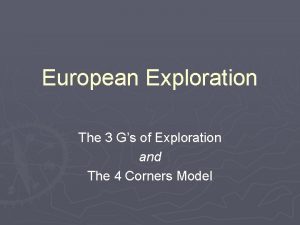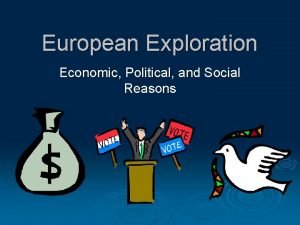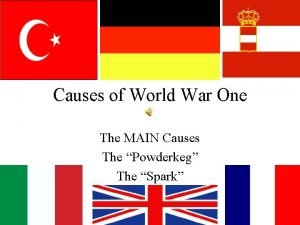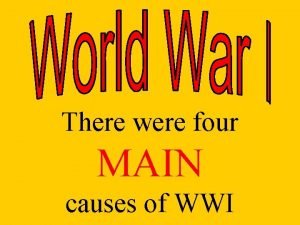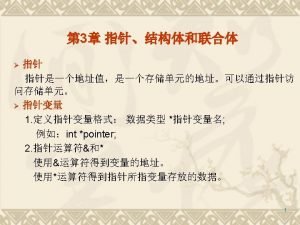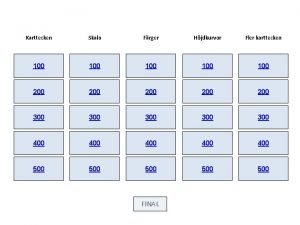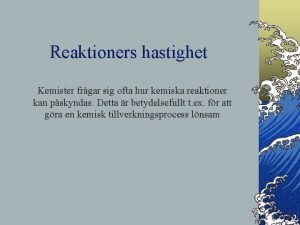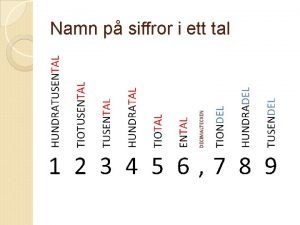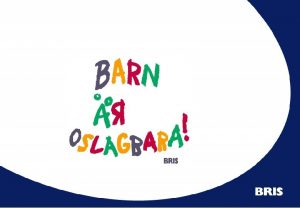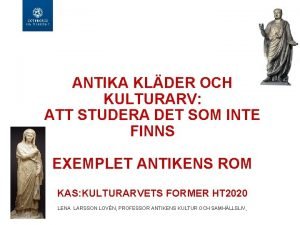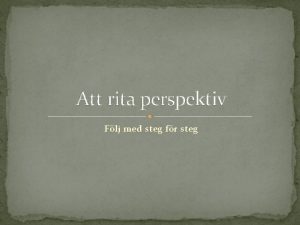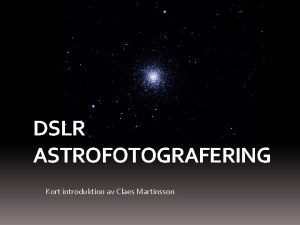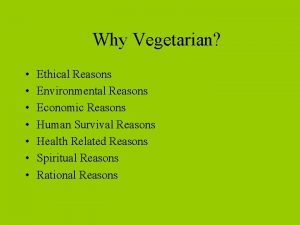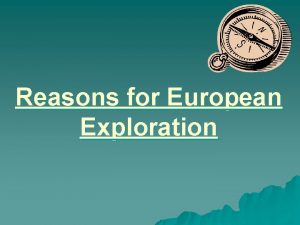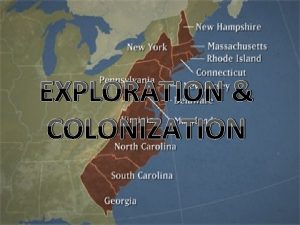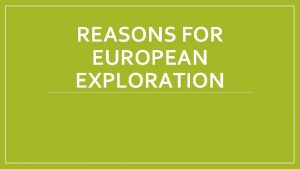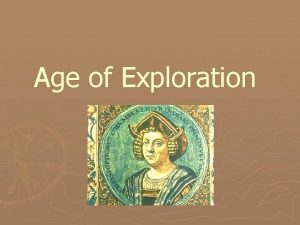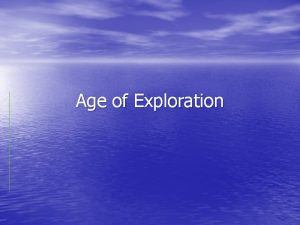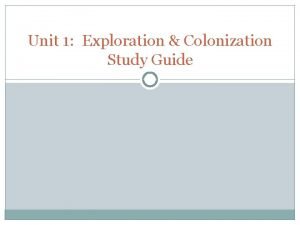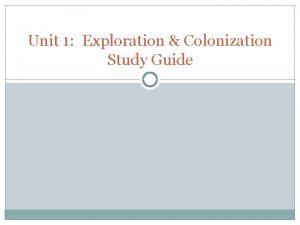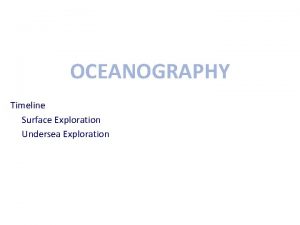Reasons for Exploration 5 Main Reasons for Exploration



































- Slides: 35

Reasons for Exploration

5 Main Reasons for Exploration

1. Gold-Economic Power and Wealth

2. Glory- Political Power for their nation (Fame)

3. God- Spread of religion, Christianity, also religious freedom and religious toleration

4. Nationalism- Sense of pride in one’s own country and wanting to increase that nation’s power and wealth.

5. Renaissance- a “rebirth” or renewed interest in the ideas of classical Greece and Rome, a period of intellectual and artistic creativity.

GOLD GLORY GOD Nationalism Renaissance

Colonialism Defined Establishment of settlers and traders from a nation in an area outside the nation’s boundaries. These establishments were called colonies and the country of origin for the colonies was called the mother country.

Reasons for Exploration and Colonization • All of the European nations (Spain, France, England the Netherlands) came to America for the same 5 major reasons: wealth and power, religion, nationalism and glory, and Renaissance, spirit of curiosity and adventure. • Europeans hoped to acquire wealth and power through reaching the continent of Asia and trading.


• Europeans sought after and acquired wealth by finding gold and silver, engaging in the fur trade, and claiming land colonies.

• France, Spain, and the Netherlands also wanted to convert Native Americans to the Roman Catholic Church.

Missionaries – People who travel to a territory or community in order to convert people to their religion.

• The English came to have freedom of religion in many variations of Protestant churches.

• The English were also the only country to allow explorers and colonists to come to America who were in conflict with their government, coming to America to live differently than they could in Europe (freedom from political oppression).

The Northwest Passage was a fabled water route through North America to Asia Countries that began exploring later (French, Dutch, English) focused on the search for it and ended up exploring & settling North America.


Areas Explored: Spain claimed most of the southern part of the United States- Florida, Texas, and the Southwestern U. S. as well as lands further south-Mexico, Central America, South America and the islands of the West Indies.

Areas. Explored: France (looking for the Northwest Passage) explored along inland waterways: the St. Lawrence River, the Great Lakes, and the Mississippi River.

France Claimed areas near the Great Lakes and along the Mississippi River. They were fur traders and trappers. Trappers- People who capture and kill animals, such as beavers, for their fur.

The French colony of New France, centered in Quebec, was located in present day Canada.

Areas. Explored: England claimed the Atlantic coast and Hudson Bay in Canada.

Areas. Explored: The Dutch colony of New Netherland was founded around the Hudson River in the state of New York near present day New York City. (This put the Dutch in the middle of the English colonies. )



Negative Consequences Diseases (typhus, measles, malaria, cholera, influenza, and small pox) reduced Native Indian populations of Americas by 90%-95%

Spanish enslaved Native Americans

Spanish and English both imported slaves from Africa (Between 10 -15 million over 350 years).

English used indentured servants (African and European) and Spain instituted a rigid social class system.

English forced Native Americans off their land

English began the American tobacco industry.

Positive and Lasting Contributions to American Life: • English became the dominant language. • Potatoes and Corn became staples of the European diet which resulted in a rapid population growth.

Positive Contributions Continued • American concepts of law and government came from the English colonies, people governing themselves (self government) electing representatives, written laws, equality under the law, freedom of religion and the right to disagree with the government.

 What were the 3 g's that motivated european exploration
What were the 3 g's that motivated european exploration What are the 5 reasons for exploration
What are the 5 reasons for exploration Three gs
Three gs European exploration economic reasons
European exploration economic reasons Wwi causes main
Wwi causes main Main cause of ww1
Main cause of ww1 Three reasons why authors write
Three reasons why authors write Simulateries
Simulateries A.1 determine the main idea of a passage
A.1 determine the main idea of a passage Void main int main
Void main int main Form of will future
Form of will future Typiska drag för en novell
Typiska drag för en novell Tack för att ni har lyssnat
Tack för att ni har lyssnat Smärtskolan kunskap för livet
Smärtskolan kunskap för livet Karttecken sten
Karttecken sten Luftstrupen för medicinare
Luftstrupen för medicinare Trög för kemist
Trög för kemist Magnetsjukhus
Magnetsjukhus Vilka tal pekar pilarna på
Vilka tal pekar pilarna på Personalliggare bygg undantag
Personalliggare bygg undantag Blomman för dagen drog
Blomman för dagen drog Borra hål för knoppar
Borra hål för knoppar Bris för vuxna
Bris för vuxna Mat för unga idrottare
Mat för unga idrottare Etik och ledarskap etisk kod för chefer
Etik och ledarskap etisk kod för chefer Publik sektor
Publik sektor Teckenspråk minoritetsspråk argument
Teckenspråk minoritetsspråk argument Humanitr
Humanitr Datorkunskap för nybörjare
Datorkunskap för nybörjare Vad kallas den mantel som bars av kvinnor i antikens rom
Vad kallas den mantel som bars av kvinnor i antikens rom Nationell inriktning för artificiell intelligens
Nationell inriktning för artificiell intelligens Rita perspektiv
Rita perspektiv Ministerstyre för och nackdelar
Ministerstyre för och nackdelar Redogör för vad psykologi är
Redogör för vad psykologi är Geometriska former i förskolan
Geometriska former i förskolan Bästa kameran för astrofoto
Bästa kameran för astrofoto
